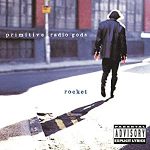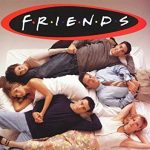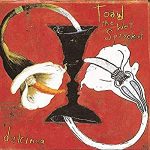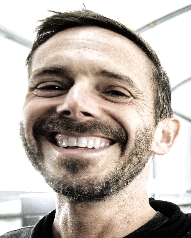Toad the Wet Sprocket chose the name for their band because it sounded funny, and it was meant to be temporary. That was over 30 years ago.
The bandmembers – singer/songwriter/guitarist Glen Phillips, guitarist/songwriter Todd Nichols, drummer Randy Guss, and bassist Dean Dinning – knew each other from San Marcos High School in Santa Barbara. Phillips was only 15 when the band formed, Nichols and Dinning were 19, and Dinning was 20. The band had a breakthrough with their third album fear, released in 1991. This spawned the hits “All I Want” and “Walk on the Ocean”, which still have healthy airplay on the radio. Later hits included “Fall Down”, and “Good Intentions”. The band broke up in 1998, but have now been back together for over a decade.
This interview with Glen Phillips was for a preview article for noozhawk.com for the 1/30/20 and 1/31/20 Toad the Wet Sprocket shows at the Lobero Theatre in their hometown of Santa Barbara. It was done by phone on 1/13/20. (Eli Reskow photo)
Jeff Moehlis: Can you give a nutshell history of how Toad the Wet Sprocket formed here in Santa Barbara?

Glen Phillips: It was just your typical high school band that started playing at San Marcos. We were in the theater program there, and Todd [Nichols] knew how to play the riffs from the Boston song “More Than a Feeling”. I thought that was pretty cool [laughs], so we just started writing songs together. The next thing, we put out one record in town, recorded another record, and then somehow by accident found ourselves getting a record deal. So it’s all been one big happy accident.
JM: Most high school bands don’t really go anywhere. Why do you think it work out so well for you guys?
GP: I don’t know. That’s a good question [laughs]. I am unsure of the answer. I mean, we believed in working hard, and I think our songs resonated with people. We were doing something that was vulnerable and honest, and aside from that I don’t know.
Maybe because we weren’t trying hard at the other stuff. We were kind of poor marketers, and poor at image creation and thinking about that side of things. So I think maybe our lack of business acumen hurt us, but it may have also helped because I think people felt comfortable with us. We weren’t trying to be something we weren’t. We were just as nerdy as we actually were.
JM: Can you tell us about what the Santa Barbara music scene was like back in those early days of Toad the Wet Sprocket?
GP: It was pretty cool back then. We mostly played in this place in Goleta called Pat’s Grass Shack. The guy who ran it, Larry [Riley], was kind of a curmudgeon, and he thought that [music publishing companies] ASCAP and BMI were pirates trying to take his hard-earned money. He refused to pay for music licensing, which meant that you could only play originals. So there was this club where you could only play original music, but it wasn’t like he was a major local music fan, it was more that he was just a cheap bastard [laughs]. If you started playing “Happy Birthday” he would shut you down, because that was copyrighted, and he could get fined for it [laughs]. Which also meant that he couldn’t even play the radio. There was no music except for live music.

So it ended up being a great thing, because there were all these bands – The I-Rails who later turned into Primitive Radio Gods, The Mudheads from Ventura, bands like The Woodburning Project who’s actually going to be opening for us at the Lobero, which I’m terribly excited about. There was this great music scene happening in town, and all these bands who were really happy to support each other. Once again, this was before everybody was looking at their phones, before you could stream stuff, back when there were less channels. You had to get a big box on top of your TV if you wanted more than 13 channels. I think that people did more, and went to see live music more. As kids, you had to come up with something, so there were a lot of bands around, and a lot more support for live music.

And the scene here was really great. It was, like, healthily competitive, if that makes sense. Bands would really support each other, and there were clubs like the Noise Chamber that Matt Ballesteros had – he had a Goth band called This Ascension. It was set up like a Goth club, but at the same time it was tiny. You could only fit, like, 30 people in there. But the shows there were awesome. The variety of bands was great.
We’d play out at Isla Vista at The Red Barn, which was ostensibly a punk venue. It was owned by the city and people would rent it out and put on these punk rock shows, where there’d be five bands and there’d be a pit going and everybody’d be dancing, and then we would get on and everybody would sit cross-legged on the floor and we would do our mellow, vulnerable thing, and then the next band would come on and everybody’d get up and start the pit again [laughs]. It was pretty great. We had a number of places to play, and as a teenager it was the best thing to do with all those hours in the day.
JM: Things really took off for the band with your third album, fear. What are your reflections looking back on that album?
GP: You know, it was the first one for the major label. We had signed with Columbia in part because they gave us complete creative control. Our guy [record executive] Ron Oberman was great. He just let us do whatever the hell we wanted to. And we wanted to make a big record. I was really in love with Tears for Fears and Talk Talk, and these kind of big, beautifully produced, thought-out records, Kate Bush, and Peter Gabriel. So we wanted to make something that was lush, because we’d made our first records on a shoestring budget, and they were just live lead vocals – we just went in and played them, basically. So it was like, “What happens if we get more than one take?” [laughs] That sounds so exciting. There was a bit of a kitchen sink thing.

It was so fun to get to learn how to make a record. Gavin MacKillop produced it, and he taught us so much about how to listen to each other, and just how to arrange, how to think about record making. He was a great teacher, and very Socratic as well. Even bringing in songs at the beginning, for pre-production, he would just say, “I’m getting a little bored with the third verse. Something needs to change.” And so I would have to figure out if I was repeating myself, or what was going on, or if I actually really loved it just the way it was. Instead of reaching in and fixing an issue, he would point out a place and then ask us how we wanted to address it. So we really learned how to pay attention, and how to make things just slightly nonlinear, so that you’re surprised just enough that you’re always paying a little attention.
JM: My favorite song from Toad the Wet Sprocket is “All I Want”. How did that song come together?
GP: That song was a funny one, because we really thought of ourselves as this indie band. We had a chip on our shoulder – we were on a major label, but we weren’t going to sell out. The funny thing is that “Good Intentions”, which was one of our other biggest hits, we didn’t put it on the record because it was too pop. There was a lot of debate about whether “All I Want” should be on the record, because “it’s too candy-coated. We’re more dark.” [laughs] It almost didn’t make it onto the record. Then we ended up putting it in there. We were like, “It’s a mood. It’s good to have one moment where there’s some light coming in.”
Even as a single, it was released I think at least nine months after the record. It was the third or fourth single. So the record was going to be over, and our product manager Tom Gibson insisted on the label trying just one more song. “I think something special could happen.” He convinced the label to fund another single, and then we had a career, which is crazy. [laughs] I mean, it’s funny, because in retrospect, the head of the label and everyone like that was saying, “You need to another one like that. Everybody knew that that’s where your hits were. We all knew it from the beginning, as soon as I heard that song.” Uh huh. That’s not the story I remember. [laughs] If you knew that, you would’ve put it out first, and saved yourself a lot of money. [laughs]
And the song itself, it is a little melancholy. It’s about feeling good for a moment, and wondering where that goes, and how to hold onto it, and why we forget all the things in life, and how do we get back to them. And that’s pretty universal, right?
JM: Another song from that album was “Walk on the Ocean”. Where was the video shot for that song?
GP: It’s up north. I’m trying to remember where the lighthouse was. It’s near Point Conception.
JM: It has that Central Coast vibe.
GP: Yeah, definitely Central Coast. Up north, but I forget precisely where.

JM: You mentioned the song “Good Intentions”, and that well known from the soundtrack for the TV show Friends. How did the Friends thing come about?
GP: I don’t even know if we were ever on the show. All those film things back in the day, it would usually be that Sony was somehow involved either in the production of the soundtrack album or the film itself. Sony would try to get their bands on their soundtracks [laughs]. They would usually find some B-side and just chuck it in there and try to make some money with it.
I wasn’t hanging out with Courtney Cox, and she said, “Play me a song that feels like Friends.” [laughs] But I don’t regret it at all.
JM: You shattered my illusion about that.
GP: Yeah, Jennifer Aniston used to come over for lunch all the time, and we’d have a really good chicken salad sandwich.
JM: Of course!
GP: Never happened.
JM: You had a lot of success with the album fear. How did that change your approach to the next album?

GP: For the next album, we were still thinking of ourselves as an indie band, and actually had a chip on our shoulder because there was kind of a backlash from the indie world after we had a big hit. Especially with the video for “All I Want”. Basically, it looked a little too much like “Losing My Religion”. Maybe, maybe not. But we got a lot of flack for being on MTV, and being a major label band, and kind of for ruining indie music.
It was at the time that indie was just breaking into Top 40, and we were one of those bands that happened with that transition. We were quite comfortable in the college music world. Our heroes were REM and The Waterboys and The Replacements and Husker Du. So we were uncomfortable being on Top 40 radio. If you remember the ’90’s, it was the time when Pearl Jam wouldn’t even play “Alive” for a while. “We’re not going to play our single. You’re only here for our single.” You’d get on a major label, and then pretend you didn’t want success. We were part of the problem with that.
So we wanted to make a record that sounded like we did live, and that wasn’t big and lush, and it was a lot more direct, and less overdub reliant, and had a little more muscle and a little more rock to it. I think we were trying to prove that we were still Alternative or indie. So it was in many ways a reaction to the commercial success, a negative reaction, just in the way that Vs. probably was for Pearl Jam. So a few million less copies sold. [laughs] It was a reaction, but it was actually probably stepping away from the success instead of going into it. We wanted to make a really great record, but we wanted to make a really great indie record.
JM: But, of course, that had some songs that did pretty well.
GP: We write pop enough songs, but there was a little more negative ideation on the album as a whole. But I also feel like that’s when we learned how to write songs. It’s probably our strongest piece of work from that era.
JM: One word that I see pop up a lot online when people are talking about Toad the Wet Sprocket is “underrated”. Do you feel like you guys got the respect that you deserved?
GP: Well, I don’t know what respect anyone really deserves. I mean, we got respect from the people who liked our music. We certainly got trashed or ignored by the press at the time. I don’t know. I like that people think of us as underrated. [laughs] We were, I think, influential at the time in changing the landscape with college or indie music going mainstream, and so I’m happy about that. At the same time, I’d rather be thought of as underrated than overrated.
JM: What advice would you give to an aspiring musician?
GP: It’s different at different times. Generally I would say do what you love, because you love it. I mean, if you want to be big and popular, then you’ve got to be scientific and ambitious about it. The technology and the way promo works today, you’ve got to captain your own ship, and get it going yourself. I think the age of a label coming in and making it happen for you is over, meaning they’re not even going to sign you unless you have 50,000 likes on Facebook, and 100,000 followers on Twitter. You’ve got to do that yourself now. So the idea of waiting to be discovered, you can’t sit on that anymore. Like our story wouldn’t happen today.
But that said, do what you love and put it out there. It’s really easy to make a record now, and it’s really easy to put it out there. That offers a lot of freedom and opportunity. Doing what you love for a living is a mixed blessing, because on the one hand you do what you love, and on the other hand if it’s not working so well, it’s kind of soul crushing. [laughs] But do it because you love it, and try to make it great.
JM: You’re getting a lot of attention for the band’s 30th anniversary. Are you thinking of recording something new?
GP: We’re actually working on some new stuff. There’s stuff in the hopper right now?
JM: When will that be out?
GP: Later in the year.


Discussion
No comments for “Interview: Glen Phillips”